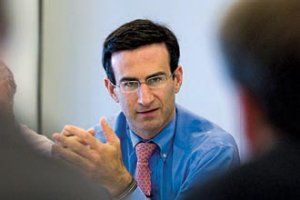
How grave are the fiscal problems of the U.S.?
Speakers, including President Bill Clinton and the co-chairs of the National Commission on Fiscal Responsibility and Reform, Erskine Bowles and Alan Simpson, discussed the dangers of America's long-term structural deficits at the 2010 Fiscal Summit: America's Challenge and a Way Forward, sponsored by the Peter G. Peterson Foundation. NEWSWEEK editor Jon Meacham asked Peter Orszag, director of the Office of Management and Budget, about the role of health-care reform in our financial future. Excerpts:
A lot of kids grow up wanting to be ballplayers. What turned you into an economist?
I wanted to be a fighter pilot, but my eyes were not good enough. It was in college that Alan Blinder, one of my very first professors at Princeton, wrote this book called Hard Heads, Soft Hearts , which really struck a chord with me because it was about trying to make people's lives better, but doing so in a rigorous way. That combination of math and real-world applicability drew me to economics.
Talk about the criticism of the healthcare plan in terms of cost reduction.
If all we did was take a traditional approach, we would still face the same underlying problem in terms of the structure and delivery of our health-care system. You need to change the underlying incentives for providers.
But that takes a cultural shift, because in my view, you want what you can get when you're sick.
Right now we have incentives for more care rather than better care. The top 25 percent of Medicare beneficiaries account for 85 percent of cost, which leads me back to the thought that we need to change the decisions that providers are making. There are important changes [in] the legislation that move us in the direction of paying for quality.
Will we see higher income taxes over the next couple of decades?
Projected spending is substantially in excess of projected revenue. Arithmetically, you need either lower spending or higher revenue, or some combination thereof. I would suspect that the political system will evolve toward some combination. But unless we adopt this evolutionary approach to paying for quality in health care, nothing else will matter.
Will there be a big shortfall in Medicare funding?
Medicare and Medicaid face a very substantial long-term imbalance, and are at the heart of our long-term fiscal imbalance, which is the motivation for moving to a different structure in those programs. The Independent Payment Advisory Board, which was created as part of the health-reform legislation, changes the way Medicare policy could be set. It has strict targets in terms of cost-growth rates that it's supposed to hit. I think it's only in Washington, D.C., that a board created to help address our long-term fiscal imbalance while boosting quality in health care and that is specifically by law prohibited from rationing care could be called a death panel.
Why is there skepticism about whether this legislation will cut costs?
First, there's traditional reduced provider payments and skepticism surrounding whether they'll actually take effect. I actually think the history of previous legislation is auspicious. When reductions are legislated, they tend to [have a bigger] effect than some of the media depictions had suggested when the bill was being debated.
It's the media's fault?
Of course it is! The second source of skepticism is whether things like the Payment Advisory Board will work. A lot will depend on implementation.
What about your own future? Are you here for the long haul?
I find this job fascinating. It's never dull, so I'm very pleased with what I'm doing.
So are you here for the long haul?
Define the long haul.
Uncommon Knowledge
Newsweek is committed to challenging conventional wisdom and finding connections in the search for common ground.
Newsweek is committed to challenging conventional wisdom and finding connections in the search for common ground.





